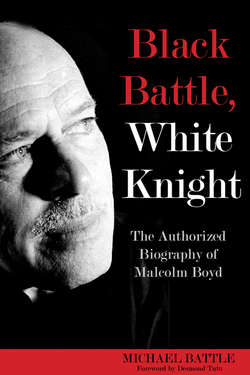Читать книгу Black Battle, White Knight - Michael Battle - Страница 11
A Complex Self
ОглавлениеTo understand how my character corresponds with Malcolm’s, one must understand two particular identities: African and Anglican. In my African-American identity, I challenge some of the divisions that characterize theological and religious discourse today. One may see this challenge in my books on Archbishop Desmond Tutu.18 Tutu’s thought is grounded by religious experience in which God creates what is good by creating what is different. Consequently, there is no legitimacy in an apartheid narrative (itself a homogeneous theology) which forms people into believing that otherness—for example, racial difference—is the foundation by which one race may dominate another. Relating my African identity to my Anglican identity proves to be another challenge. Having lived for two years in residence with Archbishop Tutu in Cape Town (1993–1994), I, as an African American, experienced Tutu’s mode of theology firsthand. I was given the unique research experience of having complete access to Tutu’s personal writing archives. Having such access and living in an African community afforded me the opportunity to present African Christian thought and practice from original data. This was one of my formative experiences as a scholar to understand myself as an authority in African Christian spirituality. This profound experience, however, provides its share of curse in the midst of blessing.
The curse entails two aspects. The first is the difficult process of synthesizing African and Anglican identities in light of colonialism. This is an acute concern since I was ordained a priest in a colonial church, the Anglican Church, by Archbishop Tutu in Cape Town at St. George’s Cathedral on my birthday, December 12, 1993.
In light of the above, perhaps, one may begin to see the context of my development. Who I have come to be as a person cannot be divorced from my African and ordained Anglican identity. African identity is particularly charged from the outset as to whether negative, imposed identities—especially identities caught in the ambiguity of legitimate or illegitimate humanity—are to be accepted. To work against this ambiguity, there can be no concept of African and Anglican identities without full disclosure of their contingent, politically oppressed histories. In other words, to understand myself, I will also need to understand how one resists seeing me. Tutu helps me see this when he states, “Who you are affects and determines to a very large extent what you see and how you see it.”19 What I intend in my biography of Malcolm is to deepen my thought about the complexities of being human, especially in the midst of a hostile environment shaped by bad religion and colonialism.
The second aspect of the curse is in the toil of successfully presenting a spirituality from an oppressed people. The guiding idea behind my view of Malcolm is that he too toiled to present a spirituality of an oppressed people. For Malcolm, an extraordinary thing happened in that he both embodied an oppressed spirituality being gay and he chose an oppressed spirituality by identifying so profoundly with black people during the Civil Rights Movement. I am like Malcolm in such an embodiment and choice, but for me, my embodiment was being black and my choice was to be Anglican. Spirituality is needed to make both the embodied identity and the chosen identity toil synchronically toward the desired effect of reconciliation and transformation. Herein lies the salient task of my work on Malcolm, to expose to the world a profound life capable of synthesizing disparate identities.
